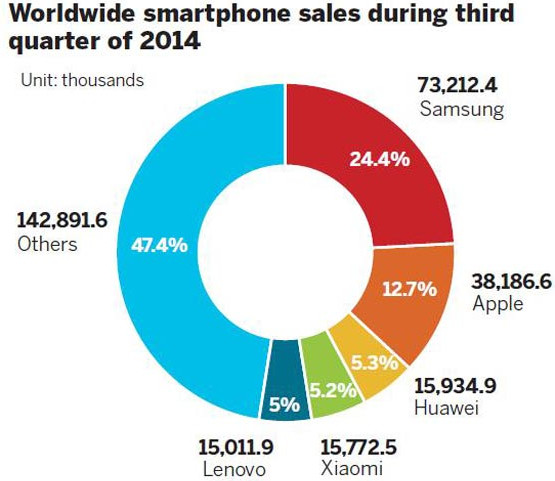

Analysts believe the operating system will dominate global mobile phone market
Despite declining smartphone shipments by Samsung Electronics Co, which still accounted for the most smartphones running on the Android operating system last year, those using systems developed by Google Inc are expected to see their market share grow at a double-digit pace in 2015, thanks to the rise of Chinese device makers.
According to a report released on Jan 7 by information technology research and advisory company Gartner Inc on the global operating system market, Android-based devices surpassed a billion shipments last year, and are expected to grow another 26 percent over the next 12 months.
Sandy Shen, an analyst with Garnter, however, firmly believes that Android will continue to widen its gap over competing mobile platforms with its dominant position remaining largely unaffected over the next five years, despite the Samsung decline.
"Samsung's market share has simply been taken over by rising Chinese vendors and other local brands. So Android will maintain its No 1 position, followed by Apple Inc's iOS, with Windows maintaining its third slot this year," Shen says.
Statistics from Strategy Analytics, a leading multinational technology consultancy, show that Android's market share increased in 2014, with 81.8 percent of smartphones sold in the year running on the operating system, up from 78.4 percent in 2013.
Apple's iOS share actually lost ground, falling from 15.5 percent in 2013 to 14.6 percent in 2014, but still enough though to hold onto the second spot.
The Samsung slowdown in smartphone sales, although it was still the world's biggest seller of Android-based phones in 2014, was most pronounced toward the second half of last year, with third quarter sales down to 79.2 million units compared with 88.4 millions units during the same period in 2013.
That slippage, however, coincided with the rise in the sales of Chinese smartphones using Android. Chinese players occupied five slots in the top 10 global smartphone vendors list in the third quarter of 2014. In the top five list, Huawei Technologies Co Ltd ranked third, Xiaomi was fourth and Lenovo Group Ltd fifth.
Just three years earlier, in the third quarter of 2011, only two Chinese vendors were in the top 10 with none in the top five, according to a Gartner report in December, the top smartphone vendor analysis.
The operating systems of most of the Chinese-produced smartphones, such as those from Xiaomi, are categorized as Android forks, which are defined as Android phones without pre-installed Google mobile services.
Gene Cao, an analyst with multinational tech consultancy Forrester Research Inc, says Chinese smartphone makers have made great progress on the hardware front.
"An increasing number of them have shifted their focus onto software. Developing customized Android systems in order to improve user experiences and differentiate themselves from their counterparts has become a core strategy," he says.
According to Cao, Chinese consumers previously paid a lot of attention to smartphone hardware, such as camera pixels. But as more vendors produced better quality smartphones their focus shifted toward software.
"The quality of the operating systems has become increasingly important because consumers are getting picky about user experience," he says.
"They want to find lots of good apps on the operating system they choose and the updating process needs to be smooth. That's why more and more Chinese vendors spare no efforts in creating their own user interface."
Devices sold by Beijing-based Xiaomi, which offers affordable phones with features that can compete with high-end rivals, run on own self-developed MIUI OS operating system, which is becoming popular with users despite its latest version, the MIUI 6, being accused of copying Apple's iOS 7.
Analysts and insiders say that the one of the key reasons for Xiaomi's huge success in China lies in MIUI, which updates its software at the request of users. MIUI has become Xiaomi's core weapon, to the point that the company runs an online forum to allow people to discuss its pro and cons, which has been avidly followed by users for years.
Xiaomi has now emerged as the best-selling Chinese brand with smartphone shipments more than tripling to 61.1 million units in 2014.
Lei Jun, its chief executive officer, claimed on his micro blog on Jan 4 that its competitors are actively studying and copying every detail of the Xiaomi model, without offering any specific details.
According to forecasts by Strategy Analytics, customized Android systems, also known as Android forks, will capture 31 percent of global smartphone sales this year, up from 29 percent in 2013. China is the key market for Android forks, but India and other emerging markets are also poised to be new marketplaces, it says.
In emerging markets where budget smartphones are becoming popular, Android forks could well challenge Google's Android One program.
Google's Android One program is a design initiative launched in the summer of 2014 to help make smartphones more affordable to develop and release. The initiative targets original equipment manufacturers specifically making phones for developing markets.
Despite the rise of Chinese smartphone vendors and their customized Android operating systems, it is still difficult for them to create their own self-developed systems to seriously challenge the existing OS landscape.
"Operating systems need lots of investment and they are not easy to implement. China does need its own OS because of national security and interests, but it might take a long time to establish a really mature one which is embraced by consumers," said Linda Sui, director of Wireless Smartphone Strategies with Strategy Analytics.
Microsoft sues Samsung over Android patent fees
2014-08-05Android security holes vex mobile users
2014-06-04Android asks too much of phones
2014-05-27Android targeted most by malware
2014-03-31China software to rival Android, iOS
2014-01-20Android gains 66 pct market share in China
2013-09-10Copyright ©1999-2018
Chinanews.com. All rights reserved.
Reproduction in whole or in part without permission is prohibited.